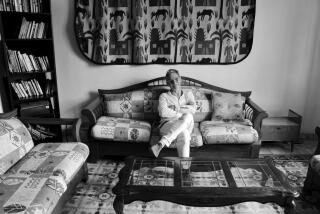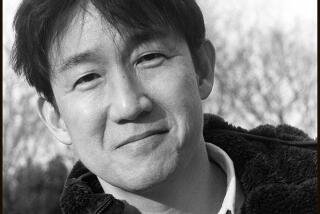Review: Mario Vargas Llosa takes on human foibles in ‘The Discreet Hero’
The title of Mario Vargas Llosa’s new novel, “The Discreet Hero,” seems guaranteed to validate the verdict of the Nobel Prize committee, who awarded Vargas Llosa the Nobel Prize in 2010 “for his cartography of structures of power and his trenchant images of the individual’s resistance, revolt, and defeat.”
Vargas Llosa has always been an openly political novelist and also entirely open about his changing political theories over the last 50 years, but what I admire most about his work is not his political insights — rather his timing, his grace and his sense of humor. When I was reading his work as a judge for the 2009 Man Booker International Prize, like the Nobel a prize for an entire body of work, I was dumbstruck by his 1981 novel (1984 in the U.S.), “The War of the End of the World,” which is set in Brazil at the end of the 19th century and explores the life and death of a religious cult not unlike so many that we have witnessed with horror over the last 30 years. “The War of the End of the World” is so ambitious, so beautifully written and structured and complete that I liked to say “this is the book ‘War and Peace’ wanted to be.”
“The Discreet Hero” is not as ambitious, but Vargas Llosa is nothing if not enterprising and flexible — some of his novels are grand and somber (“The War of the End of the World”), some are short and playful (“The Bad Girl”), some are about politics (“The Feast of the Goat”), some are about art (“The Way to Paradise”). “The Discreet Hero” is somber, but there is an undertone of amusement, perhaps at the foibles of everyone, even discreet heroes.
“The Discreet Hero” takes up the lives of two different and not evidently related men in alternating chapters — Don Ismael Carrera, a wealthy owner of a Peruvian insurance company who lives in Lima and whose wife has recently died, and Don Felicito Yanaque, the owner of a small trucking company who lives in the coastal city of Piura. As the narrative shifts between their stories, Vargas Llosa tells both of them with verve and some high drama.
Initially, the more interesting of the two is Felicito, who receives a threatening handwritten note demanding monthly protection payments of $500. He resists and suffers damage to the part of garage where his office is located. He begins to fear for not only his own life but that of his wife, his mistress, his two sons and the people he employs. The other protagonist, Ismael, has had a heart attack; because his twin sons believe he is unconscious, they chat beside his sickbed about how they wish he would die so that they might get their inheritance. They are indeed bad boys — one of them has fled the U.S. after a hit-and-run. They have already burned through the money Ismael has given them, and he knows that if he did die, they would squander everything else in a few years.
A third character, Rigoberto, works for Ismael at his insurance company. With some misgivings, Rigoberto (who is happily married, has a well-behaved son and works hard at enjoying all of life’s pleasures) witnesses the wedding of Ismael and his maid (as it turns out, the younger sister of Felicito’s wife). The couple then depart for a lengthy European honeymoon. In one scene, Rigoberto’s wife arouses him late at night in bed by relating gossip about Ismael and the maid; there is something amusing about the idea of a mere story being used for erotic purposes — a story that is not sexually graphic in any way, only romantic. It is Rigoberto who has to deal with the fallout of the wedding and its effects on his employer’s bad sons.
Vargas Llosa is good at many things, and not the least of these is doling out information. “The Discreet Hero” is a complexly plotted novel, and more than once this reader was tempted to turn to the end of the book to make sure that everything would turn out well for these sympathetic characters. Vargas Llosa is no sissy when it comes to violence — in one episode seared in my mind from “The War of the End of the World,” a soldier who has lost both his hands and his sight in the fighting begs a friend to kill him. What held me back was Vargas Llosa’s other great skill, which is re-creating the texture of the passing scene and the passing moment so beautifully that I don’t want to miss a phrase or an image.
For the American reader, this skill is almost uncanny because it makes one feel as if he or she understands Peru, Lima, Piura — that we could, if we wished, walk down the street there and feel right at home. We also understand that male-female relations there are different from those in the U.S. and that families operate by different rules and adhere to different norms.
“The Discreet Hero” is simultaneously exotic and familiar in the way that all great literature seems to be. Its ease is that of a master playing at his craft, using danger, fear, evil and empathy to carry the reader along. When Rigoberto laments his trials at the hands of Ismael’s sons, he thinks of what else he might be doing: “... losing himself morning noon and night in these volumes, prints, and designs, listening to good music, fantasizing, traveling in time, experiencing extraordinary adventures, getting emotional, growing sad, crying, becoming exalted and excited.”
Is “The Discreet Hero” one of Vargas Llosa’s great ones? It has the focus and the texture if not perhaps, the sweep. But Mario Vargas Llosa knows exactly what he is doing.
The second volume of Smiley’s Last Hundred Years trilogy, “Early Warning,” will be published in April.
The Discreet Hero
Mario Vargas Llosa
Farrar, Straus & Giroux: 326 pp., $26
More to Read
Sign up for our Book Club newsletter
Get the latest news, events and more from the Los Angeles Times Book Club, and help us get L.A. reading and talking.
You may occasionally receive promotional content from the Los Angeles Times.






